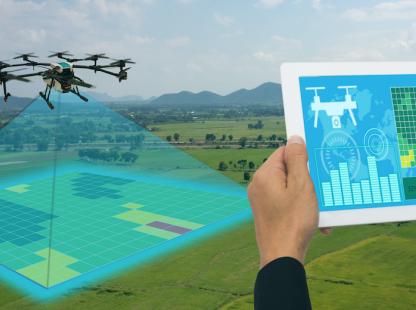
Surveying Engineering Technology (SET)
The plan of study integrates measurement science, construction technology, and data analysis to prepare students for careers in the built environment. Graduates have several opportunities with construction companies, state/government organizations, and private practice.
About the Program
At NJIT, our curriculum integrates cutting-edge technology with the technical, theoretical, and legal aspects of surveying. Students gain expertise in Computer-Aided Design (CAD) for precise mapping and modeling, leveraging drones for advanced aerial surveying and data collection, and applying state-of-the-art data analysis techniques to interpret spatial information effectively. The program emphasizes case law to ensure graduates are equipped to conduct accurate land surveys and provide crucial insights to judicial authorities in resolving boundary disputes. By combining traditional surveying principles with modern technological advancements, our graduates are prepared to excel in the evolving landscape of geospatial sciences.
What Do Surveyors Do?
Surveyors play a crucial role in shaping the world around us. They use advanced tools and technology to measure and map land, ensuring that buildings, roads, and bridges are constructed in the right places. Surveyors create detailed maps and plans that show the features of the land, such as hills, valleys, and man-made structures. They determine property boundaries, which helps to resolve disputes over land ownership. Surveyors' work is essential for making sure that construction projects are accurate, safe, and built to last.
Importance of Surveying in the Built Environment
Surveyors collaborate with architects, engineers, construction managers, and urban planners to ensure that infrastructure projects are built accurately and efficiently. Their precise measurements and data are foundational for successful project execution.
- Critical Foundations: Surveying provides the essential data needed for designing and constructing buildings, roads, bridges, and other infrastructure.
- Urban Planning: Accurate surveys help city planners, scientists and engineers create sustainable and efficient urban environments by scanning the environment and detecting patterns of change.
- Environmental Management: Surveying supports environmental protection efforts by providing precise data for land and resource management.
State-of-the-Art Technology
Surveyors use cutting-edge technology and work closely with technology experts to ensure precise and efficient data collection and analysis. This collaboration allows surveyors to stay ahead in their field and provide the best possible services. Surveyors have technical skills in several areas including:
- Drone Operation: Skills in operating drones to conduct aerial surveys and capture high-resolution imagery.
- Laser Scanning: Capability to use laser scanners for creating detailed 3D models of landscapes and structures.
- Data Collection and Analysis: Ability to gather, process, and analyze spatial data using specialized software.
- Artificial Intelligence: Understanding of AI techniques for enhancing data processing and interpretation.
- Digital Terrain Modeling: Skills in creating digital terrain models for topographic analysis and planning.
- Computer-Aided Design (CAD): Skills in using CAD software to create precise plans, drawings, and maps. This includes AutoCAD and Civil 3D.
Exciting Career Opportunities
Surveyors have diverse career paths and work with various professionals across different sectors. Whether employed by engineering and construction firms, government agencies, or as private practitioners, surveyors find dynamic and rewarding career opportunities.
- Employment Options: Work for top engineering and construction firms, government agencies, or start your own private practice.
- Specializations: Choose from specialties such as land development, geospatial technology, and environmental surveying.
- Professional Growth: A dynamic career path with opportunities for advancement and continuous learning including graduate study
Accreditation and Licensure
The New Jersey Institute of Technology (NJIT) Bachelor of Science in Surveying Engineering Technology Program is accredited by the Engineering Technology Accreditation Commission of ABET, http://www.abet.org, under the General Criteria and the Program Criteria for Surveying/Geomatics Engineering Technology and Similarly Named Programs. Graduates of the program are eligible to sit for the Land Surveying examination in New Jersey with the appropriate experience, as determined by the New Jersey Board of Professional Engineers and Land Surveyors.
Accreditation.org (https://accreditation.org/), an effort of New Jersey Institute of Technology, offers information about why program accreditation is an important consideration when choosing a degree program. The portal underscores NJIT’s commitment to accreditation and supports building awareness of the value of worldwide accreditation of academic programs in engineering, engineering technology, and computing.
Scholarship Opportunities
Each year, through the National Society of Professional Surveyors Foundation (NSPSF), over $30,000 in scholarships funded by a variety of individuals, companies, and organizations are made available to encourage and support college education in geospatial sciences. These scholarships are a great opportunity for college students in surveying, mapping, geographic information systems, and geodetic science programs. Please see more information on this page (Scholarships | School of Applied Engineering and Technology).
Program Coordinator
Professor John Wiggins
Office: Fenster Hall 219
Phone: 973.596.8193
Email: wiggins@njit.edu
Program Advisor
Dr. Angy Estrada
Telephone: 973-596-5694
Email: angy.estrada@njit.edu
Program Faculty
Adjunct Faculty Employment Opportunities
Current employment opportunities can be viewed here.